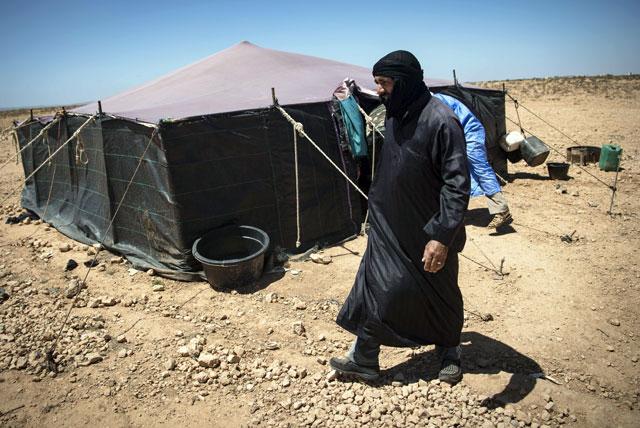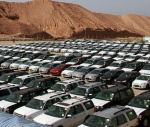You are here
Drought sharpens Morocco nomads-farmers dispute
By AFP - May 19,2019 - Last updated at May 19,2019

A nomadic herder walks near tents in the southern Moroccan Tiznit province, in the region of Souss-Massa, on April 19 (AFP photo)
TIZNIT, Morocco — "We refuse to be confined to a cage," declares nomadic herder Mouloud, asserting the rights and customs of his kin as they graze livestock in Morocco's southern expanses.
But the herders' determination to roam freely has brought them into dispute with crop farmers in the region of Souss-Massa.
In the village of Arbaa Sahel, arable farmer Hmad and many of his peers are enraged by herds stomping through wheat and corn fields.
Drought has turned parts of these plateaus arid and when water becomes scarce, tensions rise — several clashes have been reported by local media in recent months, as the herders seek pasture.
The battle is also playing out on social networks.
Videos show hooded men presented as nomadic herders, equipped with sticks and swords, attacking villagers.
Some villagers have even uploaded images of what are purported to be camel-mounted attacks on their almond groves.
A few residents have fought back by poisoning water supplies and pastures used by nomads, according to testimony on the ground.
"All these lands that belong to locals, [to] fathers and sons — they're not grazing areas," said 35-year-old Hmad, clad in leather jacket and trainers.
Exasperated, he points to wheat fields "trampled by sheep" around Arbaa Sahel, near the city of Tiznit.
The region has drawn in nomadic herders for decades — the verdant landscape a major attraction, compared to arid lands to the east.
‘Identity’
There has been a "significant rise in the arrival of flocks, due to drought" over the last couple of years, said nomad Mouloud, sporting sunglasses and a blue turban.
This has stoked tensions.
A local land organisation has recorded 18 cases of aggression by nomadic herders against farmers in Arbaa Sahel alone since December, according to Hassan, who sits on this committee.
But Moroccan authorities say only 15 cases have been recorded in the entire Souss-Massa region.
The tensions are not limited to farmland — there has been a spike in incidents in the region's forests, which cover 1.2 million hectares.
Villagers consider these forests to be their property, in line with ancestral customs.
But the nomadic culture, and the right to roam freely, form "part of the Moroccan identity", contends Mouloud.
Clutching his smart phone, he drinks tea and discusses the recent tensions with his nomadic friends, who erect large tents when they set up camp during their search for pasture.
In one such tent, women prepare food for the group — a metal tray full of grilled livers and other meat.
Abu Bakr, crouching next to Mouloud and sipping a glass of goat's milk, has dropped his studies in favour of the nomadic lifestyle.
His parents come from a desert zone around 200 kilometres away.
Some herders have this year covered distances of almost 1,000 kilometres, traversing immense swathes of desert, Abu Bakr said.
They move in all-terrain cars to escape the drought — their tents and herds packed into lorries.
When rains are rare, the nomads are constantly on the move, but their movement is more limited when rain is abundant.
"Schooling of children has pushed nomads to opt for stability," said Abu Bakr.
‘Freedom to roam’
For Mustapha Naimi, professor of Sahara studies at the University of Mohamed V in Rabat, "nomadism is very old in Morocco, but it has been reduced in recent decades by urbanisation".
Nomadic roaming by entire families has gradually given way to smaller scale pastoralism by shepherds, Naimi explained.
There are currently some 40,000 nomadic shepherds in the country, according to official statistics.
At the same time, "an increase in the number of herds, with 3.15 million heads of livestock... has contributed to conflict", according to the agriculture ministry.
Land committee member Hassan recalls when shepherds would request "permission from residents" ahead of arriving with flocks.
A law has been adopted by the central government that seeks to regulate nomadic herding and allow "a rational exploitation of vegetation".
The legislation only allows grazing of flocks in certain zones and along pre-defined routes. And nomads have to obtain a permit, or face penalties.
But this law has been rejected by both camps.
"We hold to our freedom to roam," said herder Mouloud.
On the other side of the fence, the farmers' land committee firmly opposes government-designated grazing on land that belongs to local residents.
Related Articles
Lagos - Herders are believed to have killed 25 villagers in central Nigeria's Plateau state, police said on Wednesday, in the latest violenc
TSAGAAN NUUR, Mongolia — For thousands of years Mongolia’s Dukha ethnic minority have depended on their reindeer herds to survive the bitter
OUAGADOUGOU — At least 43 people have been killed in attacks in northern Burkina Faso, the government said on Monday, in what local sources

















